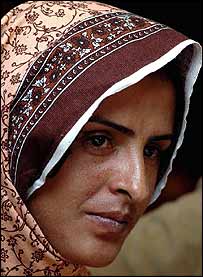This is the latest installment in the series “Dymphna’s Greatest Hits”. It was originally published on March 11, 2005. As previously, some of the embedded links no longer work.
 The Saga of Mukhtar Mai, Continued
The Saga of Mukhtar Mai, Continued
This week, the Canadian High Commissioner in Pakistan, Ms. Margaret Huber, has given Rs2.1 million to Mukhtar Mai for the continuation of her educational work in Punjab.
This follows the public outcry, going on for three years now, against the brutal gang rape of this village woman who was set up to take the retribution required for her young brother’s alleged dishonorable behavior. The whole ugly story was a set piece, a frame-up to distract attention from the fact that her brother was the first victim in this story: he was kidnapped and taken to a field to be sodomized by a group of men from a powerful family in his village
On June 22, 2002, three Mastoi men kidnapped Abdul Shakur, a tall boy 11 or 12 years of age. They took him to a sugar cane field. Then they took turns sodomizing him. “They asked me if I would tell my family,” Abdul recalled. “When I said yes, they beat me up. Then they locked me up in a room.”
Subsequently, Abdul was joined in the room by a young woman, Salma Naseen, from the Mastoi family. Then the police were summoned and the boy was accused by his sodomizers of having an affair with Salma. He was arrested and jailed.
It is at this point that Mukhtar Mai becomes the next victim. When the powerful Mastoi clan convened the village council to address their grievance, the outcome was never in doubt. The sentence in the case could have been the forced marriage of Abdul and Salma, but the Mastoi were hardly likely to agree to the union of one of their clan with a member of a poorer and less prominent family. Instead, Mukhtar was dragged from the village to the field where the tribal council had convened. In retribution for her brother’s ‘crime’ she was ordered to be raped by four men.
For an hour and a half, as other Mastoi people “danced in jubilation,” Abdul Khaliq and three other men raped her. Then Mukhtaran Mai was forced, before perhaps 300 people, to walk home naked.
Her father covered her with a shawl and took her in.
Usually, a woman thus humiliated simply commits suicide. There is no life left for her in her village after such an experience. Mai considered doing just that, and then…and then, in some mysterious transformation that can occur in the midst of devastation, Mai decided instead to fight back. She brought charges against the men. She stood firm against the death threats. The ostracism? What had she to lose after her long, naked walk home?
The higher court in Lahore overturned the convictions of the men who raped her, a legal decision which threatens her safety. But three years into this battle, Mai is too strong to kill. And the Islamofascists know it. Money has poured in from all over the world. She has used it to start schools, have them wired for electricity, buy textbooks and supplies, and begin to look for ways to make her projects self-sustaining.
Stories of courageous transcendence are universally compelling. Ms. Mai embodies the magic of transformation: a small woman in a remote village in Punjab is gang-raped. Just like so many before her, she is used and disposed of. Phoenix-like, she rises from the ashes of her humiliation and sets out to tell the world. Her story is proof that there is more to the news than simply bad news; there is also a desperate and overwhelming need for stories of personal redemption.
This case will go on to the Supreme Court. Given the outcry in all of Pakistan, the rapists may yet be sentenced. This excerpt from The Daily Times (Pakistan) illuminates the changing of the guard:
This is not a case in which a woman has been raped. This is a case in which a nation has been raped. That is how we should feel about it. This is not a case in which technicalities and police incompetence can be allowed to override national security. The issue of this country’s image is one of national security as General Musharraf has said time and again. It’s a question of how we treat one half of Pakistan. For any court to ignore this aspect is to tackle the issue very narrowly. That needs to change.
Mukhtar Mai has a website where stories can be read and donations made to her expanding projects for education and medical care in rural Pakistan:
“Hope” is the thing with feathers —
That perches in the soul —
And sings the tune without the words —
And never stops — at all— Emily Dickinson
Previously about Mukhtar Mai: “The First Step Causes the Most Trouble”

It’s easy to imagine that the angels (including you-know-who) are smiling down upon these selections.
I had not visited Gates of Vienna for quite some time, so I’m deeply shocked and sorry to hear about Dymphna’s death. My most sincere condolences to you and your family. Reading her texts was always a pleasure and made me think of a much younger woman.
Wow! Just wow!
Sadly, her latest petition against her assailants has been rejected: https://twitter.com/mukhtarmai?lang=en
This doesn’t diminish her huge achievement, in making something positive of her ordeal.
This is the Muslim way. Gross injustice and total indifference in the courts.
“ Gross injustice and total indifference in the courts.”
Within Islam, that is a distinction without a difference.
I’d like for some history buff out there to join me in searching our memory banks for the last time something like this was socially sanctioned in Europe.
Actually, I can’t think of a time.